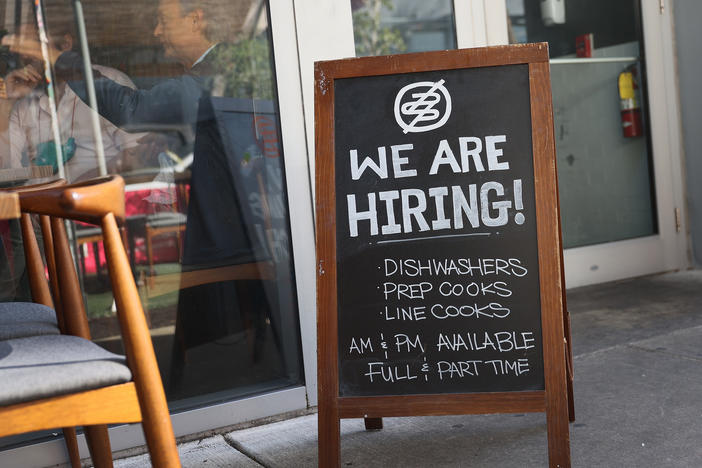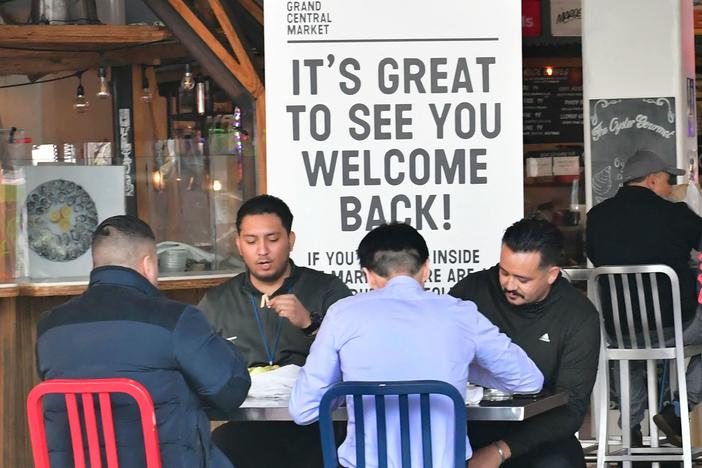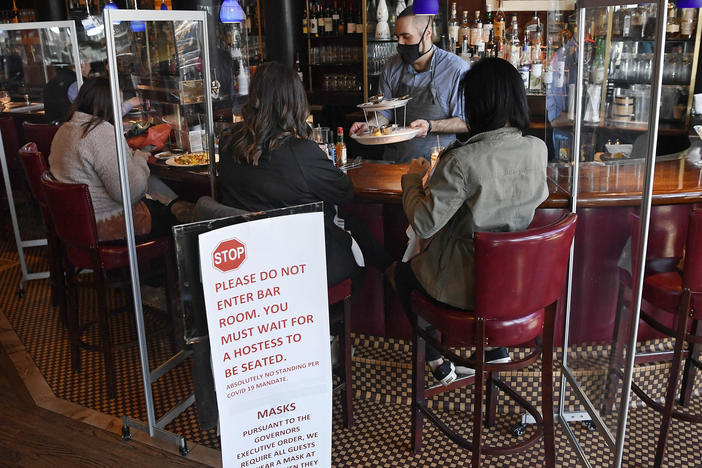Section Branding
Header Content
'It's Madness': American Factories Scramble To Secure Critical Supplies
Primary Content
U.S. factories are thriving thanks to unexpectedly strong demand for all kinds of goods, but that is also leading to unexpected headaches.
Transcript
NOEL KING, HOST:
Factories here in the U.S. have moved into overdrive because of unexpectedly strong demand for furniture, appliances and electronics. For some of them, business is almost too good. Here's NPR's Scott Horsley.
SCOTT HORSLEY, BYLINE: Drew Greenblatt's company is on a roll. The steel fabrication company's been adding new products aimed at the medical market. It's hiring new workers, and Greenblatt feels bullish enough that he's expanding his Baltimore factory by more than 50%.
DREW GREENBLATT: The economy is snapping back in a big way. People are going back to work. It's going to be a very positive, optimistic time for the American economy over the next couple of weeks and months.
HORSLEY: That's creating some growing pains, though. Strong demand caught many factories by surprise, and they're struggling to catch up while still observing COVID precautions. Greenblatt says hinges and other parts he's used to getting from suppliers in a day or two are now taking weeks to arrive.
GREENBLATT: Last month, we would've shipped 25% more if we had not had these shortages. But we had all this stuff sitting on the loading dock waiting for a caster or waiting for a hinge.
HORSLEY: Shipping bottlenecks have tied up imports, but domestic supply lines are also tangled. Just recently, Greenblatt started making wire handles used on metal pails. His steel supplier is back-ordered for months.
GREENBLATT: We use only American steel coming in from Arkansas, coming in from Illinois. And we're banging our head against the wall because if we accept an order today for these pail handles, we can't ship until July. It's madness.
HORSLEY: That's the downside of booming demand for factory products. Nicole Wolter's company makes packaging equipment used by food processors. Early in the pandemic, her customers were reluctant to bring new machines into their plants. Now, she says they can hardly wait.
NICOLE WOLTER: It's like, I need things yesterday. I need it, need it hot, hot, hot, now, now, now. Can you do more overtime? What can we do to make it happen?
HORSLEY: Wolter's employees are working overtime. She's also scrambling to find aluminum supplies and even wooden pallets. Prices are going up, and products she used to promise in six weeks now take twice that long to deliver.
A survey of manufacturers released this week finds similar delays throughout the industry. Stockpiles are shrinking. Backlogs are growing. Tim Fiore, who oversees the survey, quotes an anonymous electrical equipment manager who summed up the situation by saying, everything is a mess.
TIM FIORE: Shortages are way up. And, you know, when they say they can't get parts, if you peel through that, most of that is probably related to the fact that the people who are making those parts can't get labor. It all kind of feeds down three or four tiers to the supply chain.
HORSLEY: Fiore says those shortages are likely to persist through late summer or fall, until more people are vaccinated and feel safe going back to work.
Manufacturing is a relatively small slice of the overall economy, dwarfed by the larger services sector. But these factory shortages have gotten the attention of the White House. Peter Harrell of the National Security Council says President Biden wants to ensure that vital supplies of things like computer chips are more shockproof in the future.
(SOUNDBITE OF ARCHIVED RECORDING)
PETER HARRELL: We are going to get out of the business of reacting to supply chain crises as they arise and get into the business of preventing future supply chain problems.
HORSLEY: In the meantime, manufacturers are hustling to find their own workarounds. Nicole Wolter's been putting in long hours at her factory, trying to smooth out schedules with both customers and suppliers. As challenging as it is to meet this sudden demand, Wolter says it beats the alternative.
WOLTER: It's better than trying to figure out what your next order's going to be, and maybe you might have to lay someone off. So this is a great problem.
HORSLEY: Just this week, Wolter added three new employees, and she's looking to hire more. She's also grateful that her state, Illinois, has put factory workers near the front of the line for COVID vaccines.
Scott Horsley, NPR News, Washington.
(SOUNDBITE OF TOMMY EMMANUEL'S "JACK MAGIC") Transcript provided by NPR, Copyright NPR.
Bottom Content



